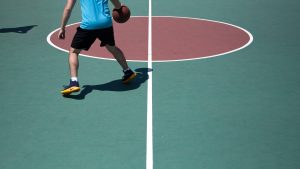
By Katherine Mannion, Staff Writer
A cornerstone of NCAA athletics has been the staunch enforcement of the amateurism of its athletes. The NCAA’s Division I handbook dedicates almost 30 pages to the concept, defining the ins and outs of where athletes can and cannot be paid before and during their collegiate careers. Among other things, the NCAA bylaws forbids contact with professional teams, prize money, and agent representation.[1] The NCAA, a non-profit that rakes in nearly $1 billion per year, believes that amateurism is crucial to maintain academic integrity for athletes and ensure they prioritize their education over athletics.[2]
However, recent developments in college athletics have shown that this definition of amateurism often has a negative effect on young athletes. Violating NCAA eligibility rules can lead athletes to lose years of eligibility and potential post-collegiate income.[3] According to these rules, student athletes cannot be paid beyond the necessary expenses required – i.e. scholarships, housing, etc.[4] This is good for many reasons, like preventing athletes from signing massive contracts with professional leagues while in school and ensuring that athletes do not shirk academic responsibilities to appeal to professional sports leagues.[5] However, the negative effects that arise upon violating these rules can be damning.
For example, as recently as October, N.C. State’s Braxton Beverly was barred from participating in college sports for the 2017-2018 school year because he attended summer classes at Ohio State before transferring to NC State as a freshman in the fall.[6] His decision to get a jump start on his academic career prior to a transfer cost him a year of eligibility. University of Central Florida kicker Donald De La Haye was ruled ineligible because he has a monetized YouTube channel, which provided him with income forbidden by the NCAA eligibility rules.[7] Similarly, Texas A&M distance runner Ryan Trahan was ruled ineligible for promoting a water bottle company he owned – and only granted eligibility if he stopped promoting his company on his YouTube channel.[8] These latter two issues arose because the NCAA believes that monetizing one’s athletic career, even if it is not for a professional team, eliminates the student-athletes’ amateurism.
While student athletes are often not purposely cutting corners on their NCAA eligibility, or appear to be doing so to further their education or their hobbies, the same cannot be said for coaches and agents. A recent FBI probe found that numerous coaches from schools that educate top-100 recruits took bribes from agents to push athletes into signing with them after college.[9] This push to create contact clearly violates NCAA amateurism rules, but the student athletes being pressured by their coaches to sign with agents also creates a culture that encourages bribery and erodes the integrity that the NCAA rules are meant to protect in the first place.[10] These flagrant abuses place student-athletes in danger of backchannel exploitation and creates a means for those in positions of power to make money off the careers of college students.
The question presented to anyone who works in or watches college sports is this – what is the most effective way to protect student athletes while ensuring they do not lose opportunities to represent their schools because the rules are unforgiving? The answer may lay with athletic compliance offices or with the NCAA’s eligibility center. It may require a loosening of the rules or perhaps paying closer attention to how they are enforced. Regardless of how the problem is addressed, it is clear from the number of accidental infractions and purposeful scandals that it must be resolved quickly and thoroughly for the good of student athletes and college sports as a whole.
Sources
[1] 2017-2018 NCAA Division I Handbook, Art. 12.1.1
[2] https://www.usatoday.com/story/sports/college/2015/03/11/ncaa-financial-statement-2014-1-billion-revenue/70161386/
[3] 2017-2018 NCAA Division I Handbook, Art. 12.11
[4] 2017-2018 NCAA Division I Handbook, Art. 12.02.3
[5] https://www.washingtonpost.com/news/in-theory/wp/2016/03/16/are-amateurism-rules-corrupting-college-athletes/?utm_term=.716615c5cdf9
[6] https://deadspin.com/n-c-state-freshman-braxton-beverly-ruled-ineligible-fo-1819445249
[7] https://www.si.com/college-football/2017/07/31/ucf-kicker-donald-de-la-haye-ineligible-ncaa-youtube-videos
[8] https://www.si.com/more-sports/2017/09/21/texas-am-runner-ryan-trahan-ineligible-ncaa-ruled-ineligbile-youtube-page
[9] https://www.si.com/college-basketball/2017/09/26/fbi-corruption-college-basketball-fraud-louisville-bribe
[10] https://www.si.com/college-basketball/2017/09/26/fbi-corruption-college-basketball-fraud-louisville-bribe